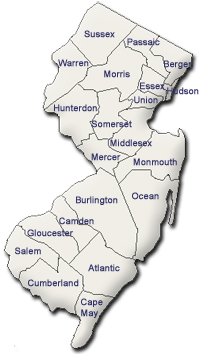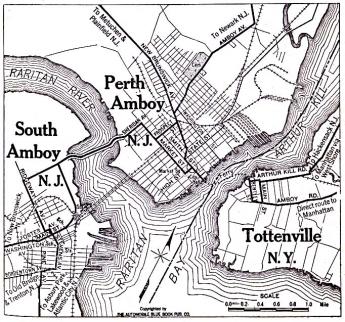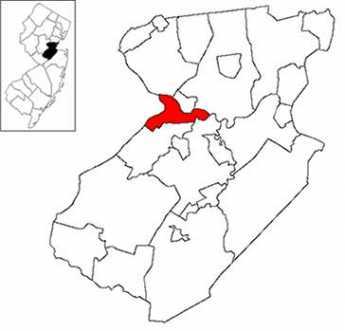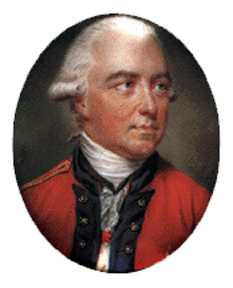Related Topics
New Jersey (State of)
 The Garden State really has two different states of mind. The motto is Liberty and Prosperity.
The Garden State really has two different states of mind. The motto is Liberty and Prosperity.
Montgomery and Bucks Counties
The Philadelphia metropolitan region has five Pennsylvania counties, four New Jersey counties, one northern county in the state of Delaware. Here are the four Pennsylvania suburban ones.
George Washington in Philadelphia
Philadelphia remains slightly miffed that Washington was so enthusiastic about moving the nation's capital next to his home on the Potomac. The fact remains that the era of Washington's eminence was Philadelphia's era; for thirty years Washington and Philadelphia dominated affairs.
Revolution in New Jersey
Early, brief but significant.
George Washington Defends Philadelphia in New Jersey

|
| Perth Amboy Map |
Not everyone would think of the New Jersey town of Perth Amboy as part of Philadelphia history or culture, but it certainly was so in colonial times. Sadly, the town is now somewhat run-down.
To understand the strategic importance of Perth Amboy to Colonial America, remember that King James thought of New Jersey as the land between the North (Hudson) River and the South (Delaware) River. This land has a narrow pinched waist in the middle. New York Bay pinches on one side, Perth Amboy marking the deepest penetration of that pinch on the East. The Western pinch is from Delaware Bay, which has a sharp angle at Trenton marked by waterfall rapids in Colonial times, where the Delaware River makes an abrupt turn from Easterly to Northwesterly. Quite naturally in the Nineteenth Century, a canal was eventually constructed along this narrow waist between two large bays, and it is easy to see why the Seventeenth Century regarded the connecting strip of land as the likely future site of important political and commercial development. The two large and dissimilar land masses adjoining this strip -- sandy South Jersey, and mountainous North Jersey -- were sparsely inhabited and largely ignored in colonial times.

|
| New Brunswick |
The name, Perth Amboy, is modified from local Indian word with the Perth part reflecting that East Jersey was primarily settled by Scottish Quakers. Like Pittsburgh at the conjunction of three rivers, Perth Amboy's local importance was that it sits at the mouth of the Raritan Bay extension of the Raritan River as it empties into New York Bay, just inside Sandy Hook. The second "river" of the fork is really just a channel between New Jersey and Staten Island. Viewed from the sea, Perth Amboy sits on a bluff, commanding that junction. (Staten Island, in a sense, here seems more naturally a part of New Jersey than New York). Amboy was the original ocean port in the area, soon overtaken by New Brunswick further upriver, as increasing commerce required safer harbors. It was the capital of East Jersey, and then the first capital of New Jersey after East and West Jersey were joined in 1704. The Royal Governor's mansion still stands there in much reduced circumstance. The grand houses of the Proprietors and Judges overlooked the banks of the bay. The last Royal Governor was William Franklin, an illegitimate son of our Benjamin. When Benjamin was stationed in London as a representative of Pennsylvania and Massachusetts, the appointment of William to a plush job in the colonies was just the normal method of government, made somewhat shabbier by King George III. Urged on to be a really King-like King by his mother, George III had considerably expanded the system of buying the loyalty of important people by giving them jobs and favors. Where people were already rich and powerful, they were offered monopolies and protective tariffs in return for their loyalty, and irritation at such intrusions into the trade was to be a main incitement of the American Revolution. William and Benjamin eventually had a permanent falling-out over political matters, and naturally American historians take the side of the father. However, it would appear that William was in fact a very good governor, a charming and diplomatic person, who used his considerable talents to smooth over the local conflicts between his King and his neighbors. Even after hostilities broke out and the rebels took over the government, William Franklin stayed on trying to calm things down, instead of fleeing behind the British lines as most Loyalists tended to do. His reward was to be packed off to confinement in Connecticut.

|
| Sir Henry Clinton |
Speaking geologically, the Raritan River is a little trickle running along the path of what was once the northern entrance to Delaware Bay. In prehistoric days, southern New Jersey was a sandy barrier island, but the gap gradually filled in along the route from Perth Amboy to Trenton, leaving sheltered harbors at both ends of a strip of unusually fine farmland attractive to early settlers. By the time of the Revolution, the strip was comfortably settled by rich farmers who tended to favor the Loyalist cause, while the pine barrens to the South and the hilly woods to the North were inhabited by newer immigrants who tended to be poor and hence favored the rebel cause. In his autobiography, Benjamin Franklin relates how, a boy, he came from Boston to Philadelphia by coming down from Perth Amboy (the capital of East Jersey) to Trenton and nearby Burlington (the capital of West Jersey), and then down Delaware to Philadelphia. Later on, Washington was to retreat down the same path from his defeats in New York, hotly pursued by the British. After the battle of Trenton, Washington promptly chased the British back up the Raritan to New Brunswick and Perth Amboy and bottled them up there by establishing winter quarters in Morristown. Much later, when the British General Henry Clinton later abandoned Philadelphia, which General Howe had captured by coming in the back door from the Chesapeake, the British marched back up the same Raritan waist of New Jersey by first crossing the Delaware to Haddonfield, up the king's Highway to Trenton/Burlington, and then East to New Brunswick and the British fleet. This was the main highway of the middle colonies, and the persisting term "King's Highway" was once completely appropriate.
When considering the relationships between New Jersey's Raritan Strip and Philadelphia in later decades, the names of Aaron Burr, Thomas Edison, Albert Einstein, Robert Oppenheimer, Doris Duke, and Charles Lindbergh come up, along with a number of others whose tales need retelling. College football was invented in a game between Rutgers and Princeton, eighteen miles apart, and Woodrow Wilson started the movement to put an end to college fraternities, called eating clubs at Princeton. But the strip itself seems to have been glorified only by Thornton Wilder.
A short play called A Happy Journey To Trenton and Camden has been a favorite production by the drama societies of Rutgers, Princeton and Lawrenceville for almost a century. As written by Wilder during the time when he was a school teacher at Lawrenceville, the occupants of a Model T rattle and bump along the strip, commenting on the passing scene. Both the play and the strip deserve more attention than they usually get.
Originally published: Thursday, July 22, 2004; most-recently modified: Monday, May 20, 2019
| Posted by: keeplooking | May 25, 2008 7:41 AM |
| Posted by: keeplooken | May 24, 2008 7:25 PM |